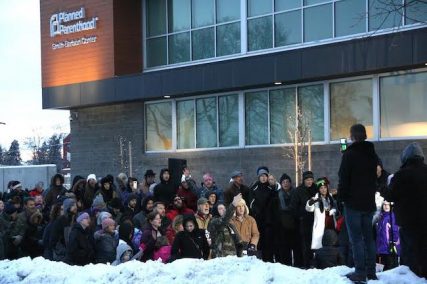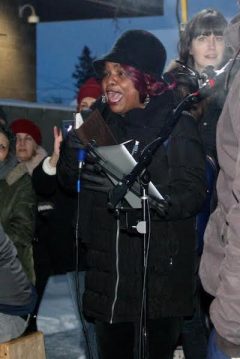Pastor Patricia Ledlow believes life begins at conception, but she had never been part of any kind of march or vigil to express that. Not until this year.
“I’ve always been a pro-lifer but just never ever felt led to get involved,” said Ledlow, who pastors The Church of Berachah (the Hebrew word for blessings) on Grand and 25th Avenue on the South Hill. “We would pray over the unborn babies and the mothers. We would do all that but never really hands on.”
On Feb. 27, Ledlow along with more than 100 mostly anti-abortion Christians gathered together in front of Planned Parenthood on 123 East Indiana Ave. to launch Spokane’s 40 Days for Life prayer vigil that will officially begin March 6 and go through April 14.
The launch was held in tandem with The Church at Planned Parenthood service that meets in front of Spokane’s Planned Parenthood the fourth Wednesday of every month from 5:30-6:15 p.m.
Ledlow was one of three pastors asked to pray for a specific aspect of the upcoming vigil. Her prayer theme was to pray for all the clients of Planned Parenthood, past, present and future.
“It’s an honor and a great privilege to be out there with my brothers and sisters standing for what is right—for what God said is just and what God said is right,” said Ledlow.
The mission for 40 Days for Life, according to its website is to “draw attention to the evil of abortion” in three ways: prayer and fasting, a constant and peaceful vigil, and community outreach.

The 40 Days for Life program began in 2008 in Spokane and has been held as fall or spring campaigns over the years, sometimes both, with the exception of 2009. This year, Spokane will be one of 377 vigil locations to take place in 28 countries.
The 40 Days for Life vigil hours in Spokane are from 6 a.m. to 6 p.m., and the idea is that someone will pray in front of Planned Parenthood for each hour during the vigil, which they sign up for on the website.
Joanna Hyatt is the campaign director for the Spokane 40 Days for Life vigil, a volunteer position, and she thinks this vigil is a great place to begin for anyone who wants to get involved in standing for women and children affected by abortion, she wrote in an email.
“It’s you and God for an hour,” said Hyatt. “You do not need to engage with anyone, nor be expected to give fully fleshed out answers to hard questions. These vigils are peaceful and compassionate.”
The only signs they will be giving out to anyone who wants to hold one as they pray state “Pray to End Abortion.”
“Since this is a peaceful, loving, and compassionate vigil, we ask that people not bring signs with silent or graphic images and to refrain from yelling or making loud displays,” Hyatt said. “Our attitude is one of humility and grace and expectation that God will move through our prayers and our gentle presence.”
Paul Dillon, vice president of public affairs for Planned Parenthood of greater Washington and North Idaho, does not see their presence as a gentle and compassionate one for the clients he serves.
“These groups are trying to communicate with fear and shame,” Dillon said. “They are perpetuating a lot of stigma around abortion. We make it very clear that a lot of our work goes toward preventative health but, at the same time, we are very proud to provide abortion services.”
Planned Parenthood is the main provider of abortions in the east side of Washington, with three to four percent of their services going to abortion.
Dillon expressed the high value Planned Parenthood places on providing safe abortions for its clients.
“We won’t be intimidated by extremists and protestors,” Dillon said. “We are the trusted experts in reproductive health care.”
In the midst of all the debate and passion surrounding this issue, abortions are actually on the decline in the nation, in Washington State, and in Spokane County.
According to the Guttmacher Institue, what used be one in three woman who would get an abortion by the age of 45 nationwide, a number based on 2008 statistics, is now nearly one in four (23.7 percent), based on their most recent 2014 statistics.
Data found on the Washington State Department of Health (DOH) Induced Abortion/Pregnancy tables also show a decline in abortions.
Comparing the most current numbers listed from 2016 with a similar year of recorded total population of pregnant woman from 2010, just a little more than one in five women (21.3 percent) in 2010 got abortions, and in 2016, about one in six (17.7 percent) got an abortion in Washington State. And in Spokane County, specifically, in 2010, one in six women (16.2 percent) had an abortion, which is now down to about one in seven (13.9 percent) in 2016. These numbers from Washington DOH include pregnant women 45+, as well.
Dillon credits part of the decline to the Planned Parenthood’s expansion of birth control access and education.

The Guttmacher Institute is in agreement with this assessment in an October 19, 2017, press release announcing the latest abortion statistics and the decline of abortions nationwide.
“The available information suggests that improvements in contraceptive use—particularly among women aged 20–24, who account for one-third of unintended pregnancies in the United States—were an important driver behind the decline,” according to that press release.
Still, many anti-abortion Christians credit their vocal and not-so-vocal outreach, the kind represented by 40 Days for Life vigils.
“If we truly love our city and our community, we don’t shy away from standing in that place of tension that comes from speaking the truth in love,” Hyatt said in an email correspondence. “How callous of us if we believe that abortion is destructive and yet will not do everything possible to compassionately and lovingly reach out to women with alternatives.”
As for Ledlow, she has signed up along with members from her congregation to pray one hour each week throughout the vigil as an extension of her church’s weekly prayer time.
“[It’s] time for us to get outside these walls because God has given us so much,” Ledlow said. “It’s time for us to get out there, and not only for abortion, but to being a witness for those who are perishing. That’s what we are called to do.”
If everyone who reads and appreciates FāVS, helps fund it, we can provide more stories like this. For as little as $5, you can support FāVS – and it only takes a minute. Thank you.
[give_form id=”53376″ show_title=”true” display_style=”button”]






